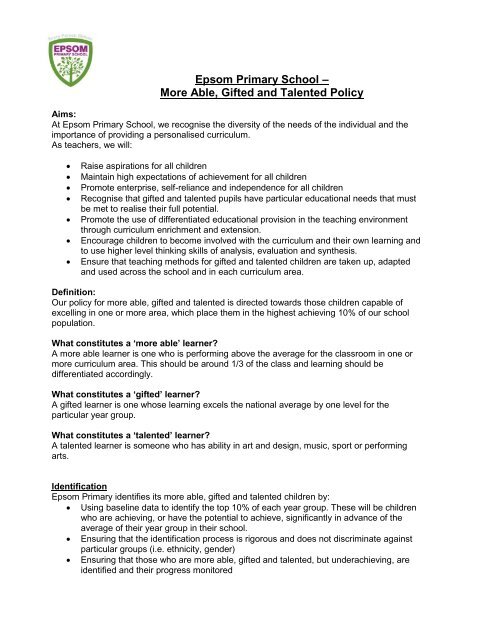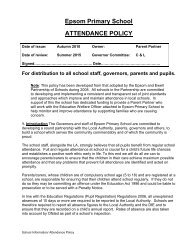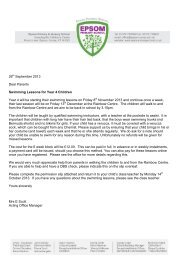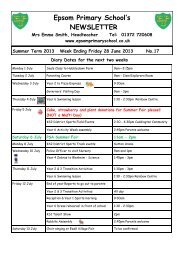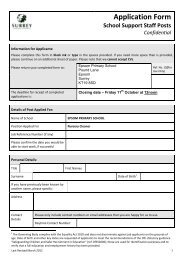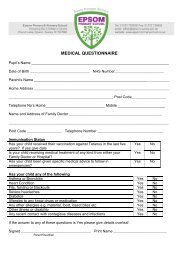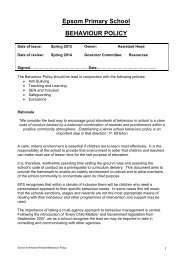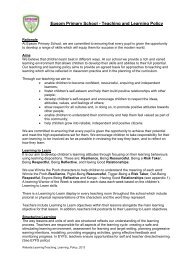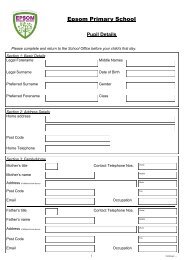Epsom Primary School â More Able, Gifted and Talented Policy
Epsom Primary School â More Able, Gifted and Talented Policy
Epsom Primary School â More Able, Gifted and Talented Policy
You also want an ePaper? Increase the reach of your titles
YUMPU automatically turns print PDFs into web optimized ePapers that Google loves.
<strong>Epsom</strong> <strong>Primary</strong> <strong>School</strong> –<strong>More</strong> <strong>Able</strong>, <strong>Gifted</strong> <strong>and</strong> <strong>Talented</strong> <strong>Policy</strong>Aims:At <strong>Epsom</strong> <strong>Primary</strong> <strong>School</strong>, we recognise the diversity of the needs of the individual <strong>and</strong> theimportance of providing a personalised curriculum.As teachers, we will:Raise aspirations for all childrenMaintain high expectations of achievement for all childrenPromote enterprise, self-reliance <strong>and</strong> independence for all childrenRecognise that gifted <strong>and</strong> talented pupils have particular educational needs that mustbe met to realise their full potential.Promote the use of differentiated educational provision in the teaching environmentthrough curriculum enrichment <strong>and</strong> extension.Encourage children to become involved with the curriculum <strong>and</strong> their own learning <strong>and</strong>to use higher level thinking skills of analysis, evaluation <strong>and</strong> synthesis.Ensure that teaching methods for gifted <strong>and</strong> talented children are taken up, adapted<strong>and</strong> used across the school <strong>and</strong> in each curriculum area.Definition:Our policy for more able, gifted <strong>and</strong> talented is directed towards those children capable ofexcelling in one or more area, which place them in the highest achieving 10% of our schoolpopulation.What constitutes a ‘more able’ learner?A more able learner is one who is performing above the average for the classroom in one ormore curriculum area. This should be around 1/3 of the class <strong>and</strong> learning should bedifferentiated accordingly.What constitutes a ‘gifted’ learner?A gifted learner is one whose learning excels the national average by one level for theparticular year group.What constitutes a ‘talented’ learner?A talented learner is someone who has ability in art <strong>and</strong> design, music, sport or performingarts.Identification<strong>Epsom</strong> <strong>Primary</strong> identifies its more able, gifted <strong>and</strong> talented children by: Using baseline data to identify the top 10% of each year group. These will be childrenwho are achieving, or have the potential to achieve, significantly in advance of theaverage of their year group in their school. Ensuring that the identification process is rigorous <strong>and</strong> does not discriminate againstparticular groups (i.e. ethnicity, gender) Ensuring that those who are more able, gifted <strong>and</strong> talented, but underachieving, areidentified <strong>and</strong> their progress monitored
Ensure that the parents of more able, gifted <strong>and</strong> talented children are updated on theirchild’s progressTeacher nominations: when a child is recognised as being able in one area of thecurriculum or more, the teacher will use the school identification form (see appendix 1)<strong>and</strong> pass it to the more able, gifted <strong>and</strong> talented co-ordinator.Parental nominations: The opinion of parents about their children is highly valued <strong>and</strong>is taken into consideration during the identification process. In order to validateparental nominations, these will be checked by the <strong>Gifted</strong> <strong>and</strong> <strong>Talented</strong> co-ordinator<strong>and</strong> approved by classroom teachers.Organisation <strong>and</strong> ProvisionThe Co-ordinator for gifted <strong>and</strong> talented pupils is responsible for monitoring the school’sprovision for pupils <strong>and</strong> works closely with the Inclusion Manager.<strong>Gifted</strong> <strong>and</strong> <strong>Talented</strong> Coordinator: Provide advice <strong>and</strong> support to colleagues by keeping ahead of current knowledge inthe field of more able, gifted <strong>and</strong> talented provision; Review <strong>and</strong> update the gifted <strong>and</strong> talented register; Review <strong>and</strong> update the more able, gifted <strong>and</strong> talented policy; Audit whole school provision for more able, gifted <strong>and</strong> talented children; Identify <strong>and</strong> address any training needs; Work with more able, gifted <strong>and</strong> talented children to challenge through acceleratedlearning sessions in English <strong>and</strong> Maths; Ensure that more able, gifted <strong>and</strong> talented children are presented with inspiringopportunities outside the classroom (e.g. visits to other schools/programmes) Communicate with parents about more able, gifted <strong>and</strong> talented provision; Nominate children to any external organizations/competitions as they arise.In the classroomClass teachers <strong>and</strong> support staff are to enhance the learning of the gifted <strong>and</strong> talented pupils.This enrichment <strong>and</strong> enhancement may be achieved through: Establishing what pupils can already do or have already done so that we are notwasting children’s time in duplication or repetition Use of stimulating <strong>and</strong> challenging questioning by the teacher to skilfully develophigher order thinking in the pupils Provision of appropriate challenge through high quality tasks for enrichment <strong>and</strong>extension which will always be available, not “more of the same Flexibility over pupil grouping, ability, mixed ability, individual. Differentiating appropriately through stimuli, resources, tasks, outcomes <strong>and</strong>responses Providing opportunity for independent learning by allowing pupils to organise their ownwork, to carry out tasks unaided, evaluate their work <strong>and</strong> become self-critical. Providing wide variety in what we prepare for pupils <strong>and</strong> in what we ask them to do. Setting individual targets
Whole school approachWe will provide: A climate within the school that ensures children feel good about achieving highst<strong>and</strong>ards The identification of the particular needs of more able <strong>and</strong> gifted children in ourplanning. The provision of appropriate resources Providing opportunities for performance e.g.o Reading aloud in class (class presentations of work or achievements)o Celebrating achievements in assemblieso Drama in the classroomo Taking part in whole school productions <strong>and</strong> class assemblies. The encouragement of children to be independent in their learning. This will includethe provision of opportunities for them to organise their own work, access theresources they need, work unaided, make their own choices about their work, evaluatewhat they are doing <strong>and</strong> be self-critical. The teaching of intellectual skills, which will include oral <strong>and</strong> written communication<strong>and</strong> information an h<strong>and</strong>ling as well as problem solving, hypothesising <strong>and</strong> otherthinking skills The celebration of achievement whilst maintaining the highest possible expectationsOutside the classroomAt <strong>Epsom</strong> <strong>Primary</strong> <strong>School</strong>, we recognise that it is important for gifted <strong>and</strong> talented pupils to beaccelerated beyond the curriculum. In addition to our classroom practice, we make thefollowing school provisions for gifted <strong>and</strong> talented pupils: English <strong>and</strong> Maths sessions for gifted children to ensure accelerated progressis made. Use of specialist art, dance <strong>and</strong> music teachers during PPA time Entrance to national competitions e.g. maths challenge competitions Involvement in county G&T workshopsGroups taken for extra sessions will be decided upon by the class teacher <strong>and</strong> throughdiscussion with more able, gifted <strong>and</strong> talented co-ordinator <strong>and</strong> also by identifying thesechildren during Pupil Progress Meetings.Working with parentsParents are informed about the identification of their children as being more able, gifted <strong>and</strong>talented on a yearly basis. They will receive feedback during the parents evenings (held twicea year).Secondary transferThe school will liaise with the local secondary school <strong>and</strong> inform them of the needs of thegifted <strong>and</strong> talented pupil.<strong>Policy</strong> reviewed: July 2013Date of next review: July 2015
<strong>More</strong> <strong>Able</strong>, <strong>Gifted</strong> <strong>and</strong> <strong>Talented</strong> Registration – Appendix 1Please could you let me know of any children in your class who you feel should be on the<strong>More</strong> <strong>Able</strong>, <strong>Gifted</strong> <strong>and</strong> <strong>Talented</strong> Register, It can be for academic or sporting/art abilities etcwhich the child displays within school or during extra-curricular activities.Please return to Strategic Teaching <strong>and</strong> Learning CoachDavina Holl<strong>and</strong>Name <strong>More</strong> able/gifted/talented Reason for identificationWhat constitutes a ‘more able’ learner?A more able learner is one who is performing above the average for the classroom in one ormore curriculum area (by a minimum of 2 N.C. sub-levels per year).What constitutes a ‘gifted’ learner?A gifted learner is one whose learning exceeds the national average by 2 N.C. levels for theparticular year group. (Beyond 5a+ in Y6, 5b in Y5, 5c in Y4, 4a in Y3, 4b in Y2 <strong>and</strong> 3a in Y1.)What constitutes a ‘talented’ learner?A talented learner is someone who has ability in art <strong>and</strong> design, music, sport or performingarts.


